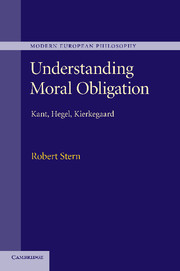7 - Kierkegaard’s solution to the problem of moral obligation
Published online by Cambridge University Press: 05 January 2012
Summary
Works of Love was published in 1847, and is one of a series of ‘Christian discourses’ that appeared under Kierkegaard’s own name around this time. Its central focus is love and the various forms that it can take, and in particular how love figures in what Jesus gives as the second commandment, or the so-called ‘royal law’: ‘You shall love your neighbour as yourself’. I will suggest in this chapter that one central purpose of Kierkegaard’s extended meditation on this commandment is to show how the limitations he has identified with the Hegelian position require us to take up a divine command account of obligation. Kierkegaard’s strategy, I will claim, is to emphasise how on the one hand morality asks much more of us than can be accommodated within the Hegelian picture (which, as we have seen, was already the theme of the pastor in Either/Or), while on the other hand we can only make sense of this demandingness if we think we are being asked to act in that way by God, whose capacity to judge, assist and forgive us differs from that of any other kind of obligating source. Thus, for Kierkegaard, only a divine command theory can make intelligible a morality that expects more of us than the limited requirements to be found within Judge William’s vision of ethical life, and its expectation that one merely ‘does what one can’.
The love commandment and the ‘moral gap’
Near the beginning of Works of Love, Kierkegaard writes:
Take a pagan who is not spoiled by having learned thoughtlessly to patter Christianity by rote or who has not been spoiled by the delusion of being a Christian – and this commandment, ‘You shall love’, will not only surprise him but will disturb him, will be an offense to him.
- Type
- Chapter
- Information
- Understanding Moral ObligationKant, Hegel, Kierkegaard, pp. 204 - 219Publisher: Cambridge University PressPrint publication year: 2011

